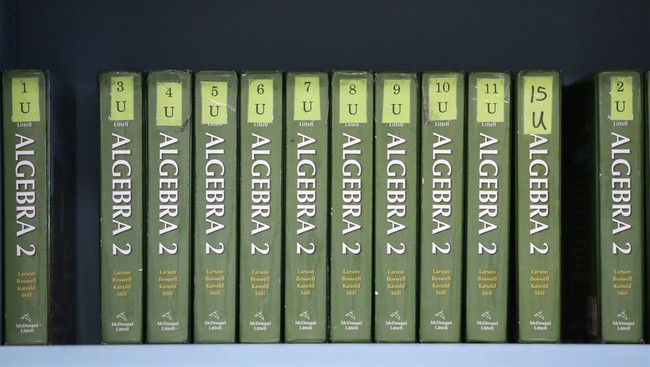The National Assessment of Educational Progress (NAEP) if frequently referred to as the nation’s report card. It’s a series of tests of US students which are consistent over several decades and allow for a comparison of how students are doing across time. The latest results out today show new lows in both math and reading.
Scores for 12th-graders in math and reading continued their years-long slide, reaching new lows on national tests, new data released Tuesday shows.
The declines were underway before the onset of the coronavirus pandemic, which broadly disrupted education, and scores have continued to fall. Policymakers had hoped there would be signs of recovery by 2024, when these tests were administered. Instead, the results were the latest indication of the pervasive challenges facing American schools and students.
Average scores fell to their lowest levels since the current versions of these tests were first administered in both math and reading, as did scores for the lowest-performing students.
The scores are broken into three categories: proficient, basic and below basic. The number of students scoring below basic has increased.
The test scores show more students are not reaching what would be considered “basic” achievement across subject areas, said Lesley Muldoon, executive director of the National Assessment Governing Board. While NAEP’s definition of “proficient” is a high bar, Muldoon said, it is not an unreasonable one, and it is based on what researchers believe students should be able to achieve by the end of high school.
In reading, the average score in 2024 was the lowest score in the history of the assessment, which began in 1992. Thirty-two percent of high school seniors scored below “basic,” meaning they were not able to find details in a text to help them understand its meaning.
In math, the average score in 2024 was the lowest since 2005, when the assessment framework changed significantly. On the test, 45% of high school seniors scored below “basic” achievement, the highest percentage since 2005. Only 33% of high school seniors were considered academically prepared for college-level math courses, a decline from 37% in 2019.
There’s another clear pattern in the results. Students at the very top have not seen their scores decline at all but students near the bottom have seen their scores collapse.
For about 10 years, declines have been most pronounced among low-performing students, indicating that the floor of academic achievement has fallen. NAEP scores among top 12th-graders — those at the 90th percentile or above — have not changed significantly over the decades these exams have been given, in either reading or math.
The new data also includes results for 8th grade science. Again, the results were bad.
Performance in 2024 declined, with 38 percent of students scoring below the basic level, compared with 33 percent in 2019.
The obvious question to ask here is what is driving this decline. There’s little doubt that remote learning during the pandemic didn’t help students succeed, especially those near the bottom of the pile. But the decline really does seem to start about five or six years before the pandemic. And that suggests another possible culprit:
D. Graham Burnett, a historian of science at Princeton, said that with the ubiquity of screens, it seems inevitable that in the future, fewer people will engage with lengthy texts.
But he argued that the cultural inheritance passed down through the generations in printed books and articles could continue through speech, performance, memorization, recitation and other age-old forms of learning.
The top comment (out of more than a thousand) on this article is from a teacher who agrees screen time is likely the cause.
I am a high school teacher 25 years into my career. This is not entirely pandemic related. Educators have been witnessing a massive academic decay over the past 10-15 years. This slide in academic and emotional maturity correlates to the gaining impacts and interactions with cell phone technologies and streaming tv services. Rarely are students curious, they seemingly don’t want to know things, that is what the internet is for. They do not read, they rarely see adults in their lives reading (books not screens), they are widely ill-informed as to what is happening locally, nationally, and globally-unless a TikTok or Snapchat influencer tells them about some event. Increasingly these children and young adults cannot sit and be quiet; they seek constant and instant input and validation and crumble or walk away at the slightest hint of friction or difficulties. They are nice people but the lack of intellectual curiosity, the desire to know things and learn about things just to have that knowledge. Their lives are jammed packed with sports, binging TV shows, and scrolling social media posts. The focus required to allow an author to unfold a narrative is an endangered quality.
The #2 comment, from a recent HS grad, echoes the same issues.
As someone who just graduated high school and actually did well, I feel like I have some insights on this…
-We are so susceptible to whatever is said on TikTok. For some reason, people will believe anything said with enough conviction. Think people are bad on FaceBook? Think again.
-Lack of motivation. People aren’t trying because we see that college graduates can’t get a job, a house, or have the money for expenses. Who wants to drown in student loans just to work for minimum wage? Ditto for the impacts that AI will have.
-Lack of focus. I’m sure everyone can see this with the rise of ADHD diagnoses (I’m not quite sure every single person diagnosed actually has it versus their brains being fried by screens) but nobody wants to sit and listen. Even when doing a “fun” activity, people will be listening to something else or scrolling TikTok while you talk to them!
And finally, people being passed no matter what. I remember in my geometry class a boy never did a single assignment. He only took the tests and routinely did poorly. However, his parents caused a fuss and he was given a high enough grade to move onto the next class. How is he supposed to do well in future math classes?
Screens and social media are not all bad and don’t seem to impact top achieving students very much. But I think the evidence is in that doom scrolling through TikTok for hours a day is not good for students near the bottom who do this in place of learning to read and do math.
Join Hot Air VIP and use the promo code FIGHT to get 60% off your VIP membership!
Read the full article here







![CNN’s Dana Bash Seems Really Worried About Tulsi Gabbard Looking Into Fulton County Voter Fraud [WATCH] CNN’s Dana Bash Seems Really Worried About Tulsi Gabbard Looking Into Fulton County Voter Fraud [WATCH]](https://www.lifezette.com/wp-content/uploads/2025/05/2025.05.16-09.36-lifezette-6827070eae555.jpg)

![Trump ‘Is Never Going to Waiver’ [WATCH] Trump ‘Is Never Going to Waiver’ [WATCH]](https://www.lifezette.com/wp-content/uploads/2025/08/2025.08.29-11.38-lifezette-68b19149e52bc.jpg)


